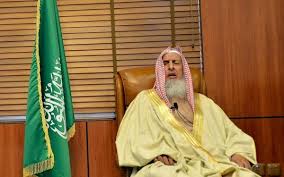RIYADH — The Kingdom of Saudi Arabia has been thrown into mourning following the death of its top Islamic cleric, Sheikh Abdul Aziz bin Abdullah Al-Sheikh, who passed away on Tuesday, September 23, 2025, at the age of 82. His death signals the end of a historic chapter in the Kingdom’s religious leadership, which he guided with authority, dedication, and deep-rooted scholarship for over two decades.
Sheikh Abdul Aziz Al-Sheikh, who was born on November 30, 1940, had served as the Grand Mufti of Saudi Arabia since 1999, succeeding the renowned Sheikh Abdul Aziz ibn Baz. Until his demise, he remained the most senior religious figure in the Kingdom, playing a pivotal role in shaping Islamic guidance and religious policy in a country widely regarded as the birthplace of Islam. His tenure was marked by consistency, conservatism, and a strong adherence to Sunni orthodoxy based on the Hanbali school of jurisprudence.
One of the most recognisable aspects of Sheikh Al-Sheikh’s legacy was his service as the official preacher during the annual Hajj pilgrimage — one of the five pillars of Islam and a spiritual gathering of millions of Muslims from across the globe. From 1402 to 1436 in the Islamic Hijri calendar (which corresponds to approximately 1981 to 2015 in the Gregorian calendar), he delivered the iconic Hajj sermon from Masjid Namirah at Mount Arafat, a spiritually significant location in Islamic tradition. For 36 uninterrupted years, his voice echoed across Arafat and into the homes of Muslims around the world, delivering sermons that stressed piety, unity, and the teachings of the Prophet Muhammad (peace be upon him).
As Grand Mufti, Sheikh Al-Sheikh held the dual role of presiding over the Council of Senior Religious Scholars and leading the Permanent Committee for Islamic Research and Fatwa Issuance — two of the highest religious bodies in the Kingdom. These institutions are instrumental in issuing legal opinions (fatwas), guiding moral conduct, and addressing theological and jurisprudential issues affecting both local and global Muslim populations. Under his stewardship, these bodies retained their traditional character while attempting to navigate an increasingly complex global landscape.
Despite rapid changes in the Kingdom and growing calls for religious reform in recent years, Sheikh Al-Sheikh remained a steady hand at the helm of Saudi Arabia’s religious establishment. He was known for upholding classical interpretations of Islamic law, even as the world around him evolved politically, socially, and technologically. His leadership was seen as a stabilising force, especially during times of uncertainty and international scrutiny.
Sheikh Abdul Aziz’s passing has drawn tributes from scholars, heads of state, and Islamic institutions across the world, with many describing him as a symbol of religious continuity and discipline. His sermons, rulings, and scholarly contributions have left an indelible mark on modern Islamic discourse and the religious life of millions. While he may have departed from this world, his influence will undoubtedly endure in the hearts of those who revered his words and in the institutional structures he helped uphold.
With his death, Saudi Arabia faces the task of appointing a new Grand Mufti — a role that carries both spiritual weight and significant responsibility within the Kingdom’s governance model. For now, however, the focus remains on honouring the life and legacy of a man who devoted his entire existence to the service of Islam and the guidance of its followers.







